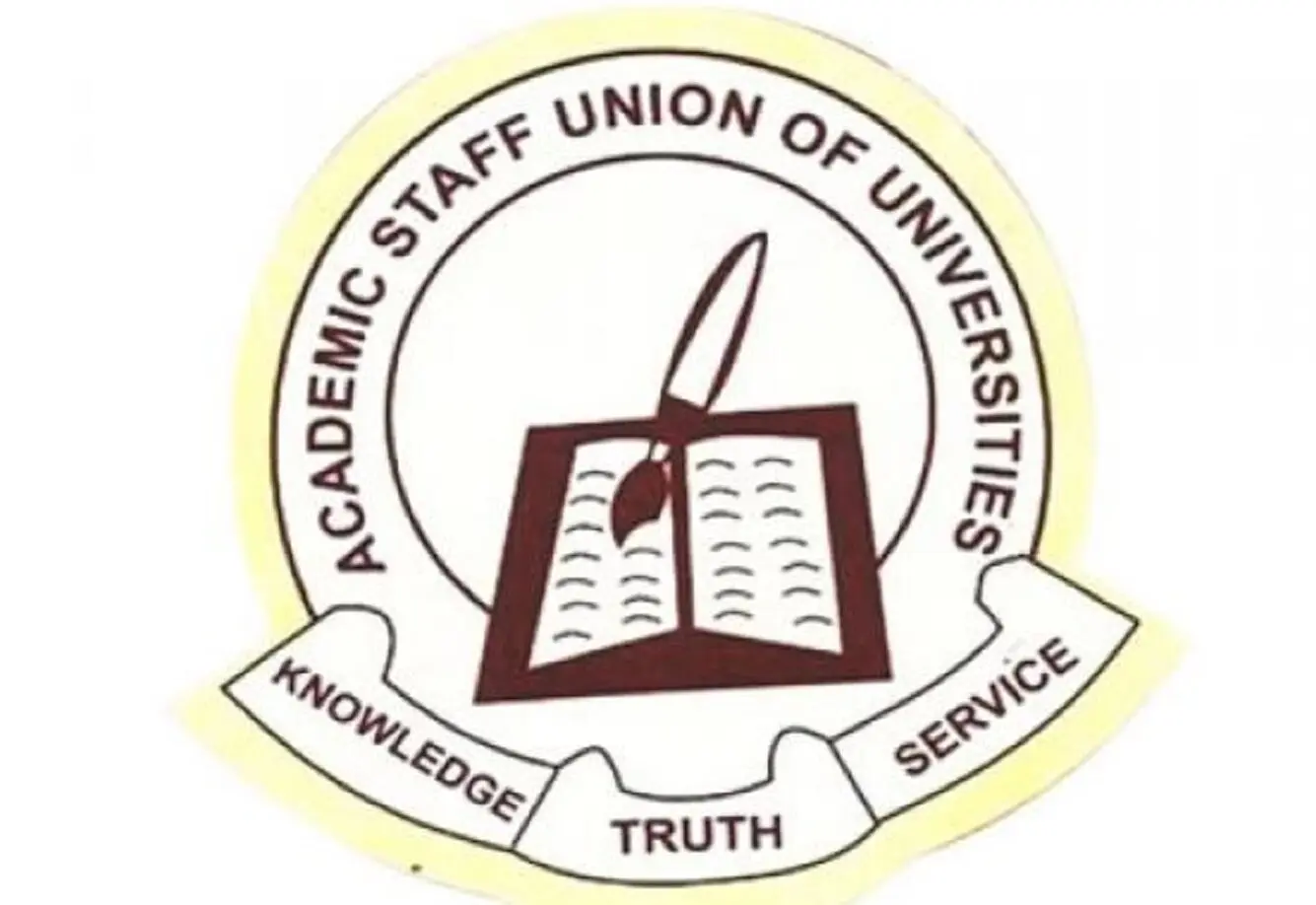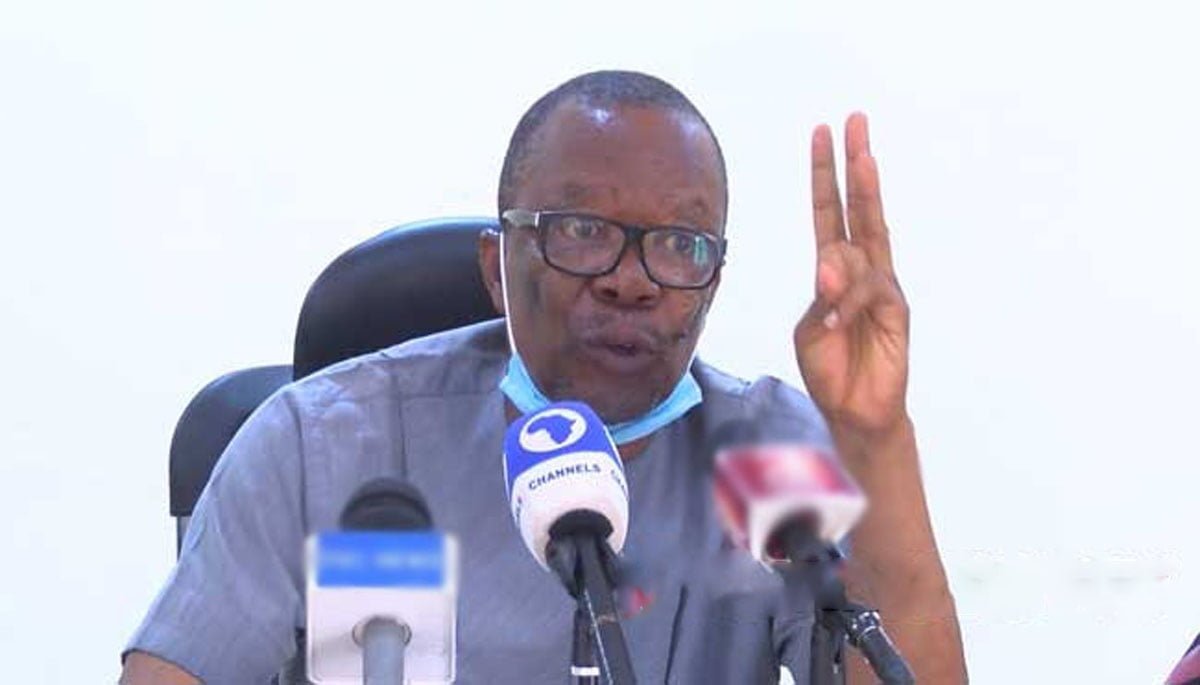Education
ASUU is complicit of corruption in ivory towers, says Buhari

Prospective govt appointees indicted for corrupt practices, drug abuse – ICPC
Corruption will kill the education sector, Jega warns
President Muhammad Buhari on Tuesday pointedly accused the Academic Staff Union of Universities (ASUU) of complicity in the menace of corruption in the tertiary education sector in the country.
President Buhari spoke in an address during the fourth National Summit on Diminishing Corruption in the Public Sector, jointly organised by the Independent Corrupt Practices and Other Related Offences Commission (ICPC), Office of the Secretary to the Government of the Federation and Joint Admission and Matriculation Board, held at the Banquet hall of the Presidential Villa, Abuja.
He said, ” Incessant strikes, especially by unions in the tertiary education, often imply that government is grossly underfunding education, but I must say that corruption in the education system from basic level to the tertiary level has been undermining our investment in the sector and those who go on prolonged strikes on flimsy reasons are no less complicit.”
The President also listed other activities by the lecturers including the deployment of disguised terminologies to perpetuate corruption in the ivory towers, a development he said, impinges on the fight against the menace in the education sector.
“Government and stakeholders in the educational sector are concerned about the manifestation of various forms of corruption in the education sector. I am aware that students in our universities, for example, use different terminologies to describe different forms of corruption they experience on our campuses.
“There is sorting or cash for marks/grades, sex for marks, sex for grade alterations, examination malpractice, and so on.
“Sexual harassment has assumed an alarming proportion. Other forms of corruption include pay-roll padding or ghost workers, lecturers taking up full-time appointments in more than one academic institution, including private institutions, lecturers writing seminar papers, projects and dissertations for students for a fee, and admission racketeering, to mention only the most glaring corrupt practices,” he said.
President Buhari, however, commended the ICPC for its due diligence in investigating and prosecuting sexual harassment as an abuse of power in the country’s educational institutions.
The President assured that the “Government will continue to fund education within realistically available revenue” while urging stakeholders, including the media to “equally advocate for transparency in the amount generated as internally generated revenue by educational institutions and how such funds are expended.”
Continuing, he said, “Corruption in the expenditure of internally generated revenue of tertiary institutions is a matter that has strangely not received the attention of stakeholders in tertiary education, including unions.”
The President further called on stakeholders to demand accountability in the administration of academic institutions and for unions to interrogate the bloated personnel and recurrent expenditure of their institutions.
He also implored the Unions to work with the government to put faces and identities to names on the payroll.
Meanwhile, the highlights of the event were the President conferring the prestigious 2022 public service Integrity award to Chief Superintendent Amah for rejecting a $200,000 bribe from robbers.
READ ALSO: 2023 elections will reflect voters’ expectations – INEC
Amah who was conferred the award by President Buhari is the Divisional Police Officer in charge of the Nasarawa Division in Kano State.
The decision to confer the award on Amah was based in the recommendation of the Chairman of the ICPC, Prof Bolaji Owasanoye last month.
The ICPC said: “On 24th April 2022, a matter was reported to him that a suspect, one Mr Ali Zaki convinced Bureau De Change Operators that he has $750,000 which he could sell to them at the rate of N430 to give him the equivalent N322,500,000.
“After a bank staff confirmed the availability of the money at the bank to the victims, the transaction took place. However, the suspect arranged with armed robbers to track and rob the victims while they were transporting the money.
“When the matter was reported to the Police Division in Kano State where SP Daniel Amah was the DPO, they recommended investigations. In the course of the investigation, they traced the principal suspect, Mr Ali Zaki who offered $200,000 to the SP to kill the case, through a bank staff. The offer was rejected, and the bank staff was promptly arrested which led to the arrest of the principal suspect. The $200,000 was recovered and registered as an exhibit.
“For this and other acts of integrity, SP Daniel Itse Amah is being conferred with the 2022 Public Service Integrity Awards.
ICPC boss, Professor Bolaji Owasanoye, said the commission was working assiduously to flush out fake appointments and screen candidates for appointment to the position of permanent secretaries among other initiatives.
He said findings from the investigation revealed that many prospective appointees are implicated in financial impropriety, corrupt practice, failure of code of conduct standards and substance abuse.
He applauded the commitment of the Head of Service to clean up the stable by effective pre-appointment screening, noting that the ICPC would continue to play its part.
Owasanoye said the commission was particularly delighted that the awardee is from the Nigeria Police, an institution he said, had often been much derided, maligned and underappreciated.
He said the ICPC has constituted a special team for investigation and prosecution of sexual harassment in secondary and tertiary institutions in response to the recent epidemic of sexual harassment in the education sector.
He said: ” ICPC has escalated its prevention mandate in the face of costly, time consuming and unpredictable outcomes of investigation and prosecution. In this regard, we are strengthening the Anti-corruption and Transparency Monitoring Unit (ACTU) in MDAs. For the education sector, we collaborated with other institutions including Nigerian Universities Commission and
National Board for Technical Education (NBTE) and much more recently with JAMB our co-host for this event.
“With JAMB and Department of State Service, we conducted last year a series of undercover operations across the country on corruption in the university admissions processes leading to the busting of syndicates and arrest of its leaders responsible for compromising Interim Joint Matriculation Board (IJMB) and Joint Universities Preliminary Examinations Board (JUPEB).
“As is now widely publicised ICPC has intensified its scrutiny of personnel and capital cost of MDAs leading to the proactive restraining of surpluses or duplications in the budget. Just last week the Commission in collaboration with the Budget Office and stakeholders met with some MDAs on the recurring surpluses in their payroll to determine proactive measures to improve the budget process.
“This is towards separating outright fraud from administrative lapses. We also actively review the budget to prevent abuse by senior civil servants and PEPs who sometimes personalise budgetary allocation for direct benefit. In one case a PEP successfully increased the budget of an agency in order for the agency to buy a property from him. In another case the PEP inserted soft projects worth over N7b for a catchment population of about One million people in the name of empowerment. Both cases are under investigation.
In his keynote address, former Chairman of the Independent National Electoral Commission, INEC, Professor Attahiru Jega, regretted that Nigeria is perceived as one of the most corrupt countries in the world.
According to him, the effects of corruption in the education sector undermine the national capacity to develop requisite national social capital for socio-economic development, adding that no nation develops without adequate and appropriate investment in education.
He lamented that the Nigerian education sector has suffered neglect, is chronically underfunded and is engulfed in crisis, compounded by the impact of corruption both from within the education sector itself and from the wider public sector.
The professor of political science noted that there is increasing evidence of how corrupt practices rooted in the wider public sector effect and compels corrupt practices in the tertiary education sector, especially universities, which he said statutorily enjoy some relative autonomy.
He said: “There are examples of how reform policies, formulated with good intentions are often circumscribed by endemic corruption in the public sector, and in their application in the education sector, create their own dynamics of corrupt practices. This can be illustrated with examples of how three reform policies by the federal government compel many Vice Chancellors of federal universities to become somewhat ‘compulsorily’, even if in some cases reluctantly, involved in or with endemic corrupt practices in the wider public sector.
“The first reform policy of measure is the Procurement Act 2007, which requires that contracts of certain threshold should seek approval either at the Ministerial Tenders Board (MTB) or at the Bureau for Public Procurement (BPP). The second is the requirement by Members of the National Assembly that every Vice-Chancellor must appear before them to defend their budgetary proposals before funds would be appropriated to their universities. The third, which is relatively more recent, is the requirement by the federal government that no university should recruit any staff, even to fill existing vacancies, without at least three layers of approvals by the federal bureaucracy, at the NUC, at the Office of the Head of the Civil Service of the Federation, and at the Office of the Accountant General of the Federation”
Jega noted that all these three policies in spite of the good intentions, which may have underlined them, not only undermined the relative autonomy of the universities but have also introduced extraneous relations and influences laden with corrupt practices.
Minister of Education, Malam Adamu Adamu commended the leadership of JAMB for “achieving what no other agencies have achieved in the recent past”
He noted Nigeria must fight corruption to be liberated, adding that differences can be made in all sectors no matter how bad it is perceived.
“Nigeria has a bad reputation of being a corrupt society. Nobody will change that except us. At a moment you see people condemning corruption and the next moment, they engage in it. We have to sincerely fight it otherwise this nation is doomed”, Adamu stated.
Meanwhile, beaming with smiles while fielding questions from Newsmen after the investiture, Amah said “I’m quite happy. Is indeed difficult to put this feeling into words. But I’m very excited.”
On what went through his mind when he rejected the huge amount of money, especially as a member of staff of a service that has been maligned over the years, he said
“Well, we have to protect the interest of the force, and the interests of the country at large. In all honesty, I take no personal credit. I believe there are very eminently qualified Nigerians out there that are doing great things for our country. To emerge from this stratum of Nigerians is indeed a great pleasure.
He dedicated the award to the Inspector General of Police, the ICPC and the President.
Education
Nafisa Spoke, the World Listened, And Nigeria Shined

Nafisa Spoke, the World Listened, And Nigeria Shined
By Matthew Eloyi
When I first read about 17-year-old Nafisa Abdullah Aminu emerging as the World Best in English Language Skills at the 2025 TeenEagle Global Finals in London, I paused, read it again, and then sat quietly, moved in a way I haven’t been in a long time. In that moment, I wasn’t just a Nigerian reading a piece of good news; I was a Nigerian filled with pride, hope, and a renewed belief in our greatness.
Let me be honest: in a country weighed down by insecurity, economic hardship, and a struggling educational system, it’s easy, too easy, to become cynical. But Nafisa’s victory pierced through that fog of despair and reminded me why I have always believed in this country, despite everything.
Think about it: this young girl, from Yobe State, a region often reduced to a footnote in conversations about insecurity and poverty, stood on a global stage in London, not just to participate, but to conquer. She didn’t just win a medal. She defeated over 20,000 participants from 69 countries, including from places where English is a first language.
Let that sink in.
As someone who has spent years writing, editing, and advocating for better education in Nigeria, I understand just how powerful and rare this kind of achievement is. I see myself in Nafisa, in her curiosity, her hunger for knowledge, and her refusal to be boxed in by circumstance. Her story makes me emotional, not just because it’s inspiring, but because it reminds me of the many gifted Nigerian children who never get the chance to shine. Nafisa represents them, and she represents what’s possible when we choose to invest in our youth.
I am also deeply moved by the humility and grace of the Aminu family, who publicly acknowledged the role of Governor Mai Mala Buni’s educational reforms and the impact of Nigerian Tulip International College in preparing their daughter for the global stage. This wasn’t a solo journey; it was a collective effort rooted in family values, good governance, and dedicated educators.
“We cannot take all the credit,” they said. And in that simple statement, they reminded me that when leadership, community, and family work together, magic happens.
Nafisa’s win isn’t just a win for Yobe State. It’s not even just a win for Nigeria. It’s a resounding answer to every doubt we’ve ever had about our potential as a nation. Her victory tells every Nigerian child that “you are enough, and the world will hear your voice if you dare to speak it.”
As I write this, I think about the millions of young girls in the North and across Nigeria who will see Nafisa’s face and think, “If she can do it, so can I.” That, right there, is the power of representation.
I join the growing chorus of voices calling for State and National Honours for Nafisa. We must celebrate her not just with headlines, but with action, by investing more in education, giving scholarships, and ensuring that no child with potential is left behind because of geography, gender, or poverty.
To Nafisa, if you ever read this, know that you didn’t just win a competition; you reignited a nation’s pride. You gave us something we desperately needed: a reason to believe again.
And to Nigeria, this is who we are: brilliant, resilient, and unstoppable when given a chance.
Nafisa didn’t just make Yobe proud. She made me proud. She made us proud.
Education
NELFUND Begins Upkeep Payments to Over 3,600 Students After Bank Detail Update

The Nigerian Education Loan Fund (NELFUND) has commenced the disbursement of upkeep payments to students who successfully updated their bank account details from digital wallets to commercial bank accounts.
This was announced in a statement released on Friday in Abuja by the Director of Strategic Communications of the Fund, Mrs. Oseyemi Oluwatuyi.
Oluwatuyi described the development as a significant breakthrough in addressing earlier disbursement delays.
“Over 3,600 students, who previously registered with digital-only banking platforms, have now successfully received their backlog of upkeep payments after updating their details to conventional commercial bank accounts on the NELFUND portal,” she stated.
“We appreciate the patience and understanding of all affected students during this period. Your resilience and cooperation have made this progress possible,” she added.
The NELFUND spokesperson advised students who have yet to update their bank details to raise a support ticket via the official NELFUND portal to request access for the update.
She further urged affected students to report through the IT office of their respective institutions, which would compile and forward all related cases to NELFUND for prompt resolution.
“NELFUND remains committed to ensuring that no eligible student is left behind. This resolution process is part of our broader effort to enhance the efficiency, transparency, and student-centered delivery of our support services,” she said.
Oluwatuyi encouraged students to continue engaging only through official NELFUND channels and to assist their peers who may need help navigating the update process.
She also provided contact options for inquiries, stating that the fund can be reached via email at info@nelf.gov.ng or through its official social media handles: X (formerly Twitter) @nelfund; Instagram @nelfund; and Facebook & LinkedIn: Nigerian Education Loan Fund – NELFUND.
Education
NELFUND Urges Institutions to Upload Student Data for Loan Processing

The Nigerian Education Loan Fund (NELFUND) has issued a directive to all accredited tertiary institutions to verify and upload their students’ data on the newly digitised Student Loan Application System (SLAS).
This was disclosed in a statement released in Abuja on Wednesday by the Director of Strategic Communications at NELFUND, Mrs Oseyemi Oluwatuyi.
According to Oluwatuyi, the SLAS platform has been fully digitised to streamline and accelerate the student loan processing experience for both institutions and applicants.
“With this upgrade, all accredited institutions are now required to request access to SLAS to verify and upload student data related to loan applications,” she said.
She described the move as “a critical step that ensures the timely processing and disbursement of approved student loans.”
Institutions that have not yet been onboarded onto the system, she said, are advised to send an access request to registration@nelf.gov.ng without delay.
“Once granted access, institutions will be able to view a real-time dashboard of their students’ loan applications, verify submitted data, and track the status of each application,” Oluwatuyi explained.
She called on all institutions to take immediate action in the interest of their students, stressing that verification and data upload by institutions are mandatory steps before final approval and disbursement of loans can be completed.
On the students’ side, Oluwatuyi noted that if an application status currently shows “Verified,” it means the application has passed initial checks. However, final approval and disbursement depend on the institutions’ confirmation and data upload.
“Once this process is completed, your status will be updated to ‘Disbursed’ when the payment of your fees has been processed,” she added.
She also encouraged students to reach out to the fund for assistance via email at info@nelf.gov.ng.
Other official communication channels include:
-
X (formerly Twitter): @nelfund
-
Instagram: @nelfund
-
Facebook & LinkedIn: Nigerian Education Loan Fund – NELFUND
-

 Headlines4 years ago
Headlines4 years agoFacebook, Instagram Temporarily Allow Posts on Ukraine War Calling for Violence Against Invading Russians or Putin’s Death
-

 Headlines4 years ago
Headlines4 years agoNigeria, Other West African Countries Facing Worst Food Crisis in 10 Years, Aid Groups Say
-

 Foreign3 years ago
Foreign3 years agoNew York Consulate installs machines for 10-year passport
-

 News1 year ago
News1 year agoZero Trust Architecture in a Remote World: Securing the New Normal
-

 Entertainment3 years ago
Entertainment3 years agoPhyna emerges winner of Big Brother Naija Season 7
-

 Headlines1 year ago
Headlines1 year agoNigeria Customs modernisation project to check extortion of traders
-

 Entertainment2 years ago
Entertainment2 years agoMovie download platform, Netnaija, announces closure
-

 Economy2 years ago
Economy2 years agoWe generated N30.2 bn revenue in three months – Kano NCS Comptroller














